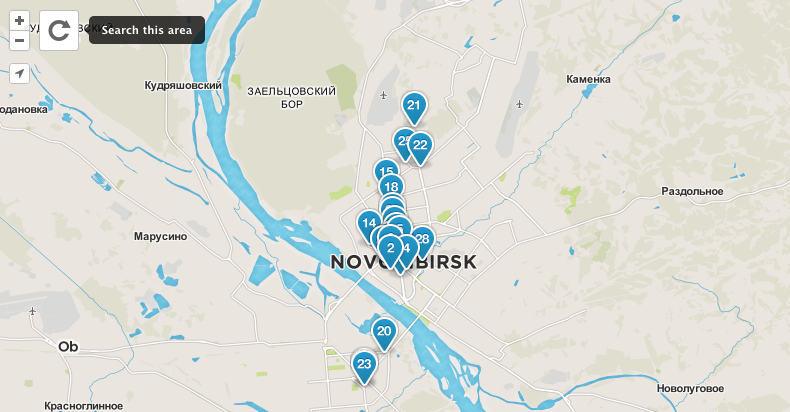Imagine you’re vacationing in Belem, Brazil. You want to know which pubs to drink at, which restaurants to eat at, or which cafe make the best arroz doce.
Now, imagine if instead of searching aimlessly for recommendations on the internet, you can simply open up an application on your smartphone, and have immediate access to a database of suggestions. Or better yet, your smartwatch or heads-up display automatically feeds you suggestions as you walk around.
While we haven’t yet reached the point of ultimate geolocation domination, there is a location-based social networking website that provides location details from places all around the world—including Belem. It’s called Foursquare, and chances are you’ve probably heard of it.
I know what many of you are probably thinking: isn’t Foursquare that app that all of my friends use to “check-in” to different venues? Well, until last night that was my understanding of Foursquare, but, as it turns out it is much more than that.
Foursquare is a tool that helps you navigate the world around you. It allows you to discover new places, connect with friends, and yes check-in to different venues virtually anywhere in the world.
Last night in San Francisco at an event hosted by ReadWriteMix, CEO and co-founder of Foursquare Dennis Crowley spoke on issues regarding Foursquare’s evolution and future development. What I found particularly interesting was Location APIs, Foursquare’s explosive growth, and their future initiatives.
Location APIs
Location APIs can be used to build location aware applications. The API will pull information from a database full of handy locational data to create geolocation features on apps for personal computers and mobile devices.
To build a superior location API, you need a superior database—and Foursquare has just that. Since 2009 Foursquare has collected over 6 billion check-ins worldwide, allowing them to map locations all over the world.
Crowley suggested a reason for Foursquare’s success is their extremely accurate check-in feature.
This has allowed them to build an excellent location API:
The Foursquare API gives you access to our world-class places database and the ability to interact with Foursquare users and merchants. Start using the only location API you’ll ever need.
Foursquare’s location API is rapidly gaining value with roughly 6 million check-ins a day. The reputation of Foursquare’s location database has improved over the years. It currently provides data location information to apps across the web, ranging from Pinterest to Flickr.
Up until recently, Foursquare’s database even powered the hugely popular photo-sharing app Instagram. Even after the popular photo-sharing application was acquired by Facebook in 2012, Instagram continued to use Foursquare’s location data rather than Facebook’s own Place API. It wasn’t until earlier this year, roughly 2 years after the acquisition, that Instagram started using Facebook’s API.
In a TechCrunch article, Jonathan Barouch suggests that:
Foursquare’s API is fast becoming the de facto location layer of the mobile web and touches almost every user of location-based apps.
The extensive collection of location data Foursquare has accumulated has placed them in a position to be the poster child for location-based apps.
The Importance of Location Aware Apps
More and more, the accuracy of location APIs are essential to building a good app. I can imagine a future where you are running just a few minutes late for work, and because your location-aware wristband knows precisely where you are, they can alert your boss that you will be exactly 7 minutes late.
The value in location data is different for everyone. Some want historic data of the venues they’ve attended, others simply want to update their friends, while some simply want recommendations for good restaurants in the area.
I think location-aware applications are only going to gain popularity with the trend of wearable technology on the horizon.
Unbundling Foursquare
Foursquare has started to unbundle its services. Part of this transition was last-month’s release of the application Swarm.
The new app from Foursquare is designed to help you keep up and meet up with your friends. It’s a simplified way to check in to your favorite venues, and discover which friends are nearby.
Both the Foursquare app and Swarm are complementary to each other: where you can now continue to use Foursquare to discover new places. Foursquare will release the new Foursquare app sometime in the near future, Crowley indicated.
The decision for the unbundling of Foursquare is simple: different people have different uses for the application. By unbundling the app, Foursquare can more efficiently service these different needs. Crowley suggested that it’s a way to provide everyone’s favorite features in a simpler, easier, and lighter way.
Future of Foursquare
Foursquare continues to see worldwide growth. Just recently, Foursquare has seen explosive growth in Turkey, Russia, and Brazil, Crowley stated. This could be because maybe people are just getting their first smartphones, he hypothesized.
Another possibility is that perhaps people are starting to understand the capabilities of Foursquare. Where else can you find advice on where to get a great cappuccino in Novosibirsk, Russia?
The growth of Foursquare has been significant over the past few years, and its likely that we will continue to see this scale widen in the days to come. Stay tuned, Crowley indicated that the best stuff you will see from Foursquare will be released later this year.
What do you think about the future of location-aware apps?
 Marie Dodson is an assistant editor at Torque. She graduated from Cornell University with a degree in Biology and Society. She enjoys wine, good books, and travel.
Marie Dodson is an assistant editor at Torque. She graduated from Cornell University with a degree in Biology and Society. She enjoys wine, good books, and travel.




No Comments